Tenuous employment. Dangerous working conditions. The pandemic has exposed fundamental flaws with how the hospitality industry operates.
Clarissa-Jan Lim BuzzFeed News Reporter
Posted on May 28, 2021,

Ting Shen for BuzzFeed News
Keisha Banks
For two decades, Keisha Banks had worked on and off in the hospitality industry — until last year, when she was unceremoniously let go from her job as an event server at the Chateau Marmont via a mass email sent in March 2020 to employees of the iconic Hollywood hotel.
Banks, 41, had an inkling that things were going downhill in the industry as soon as hotel guests started “dropping off like flies” in early March, canceling their reservations for events and rooms. She told BuzzFeed News she was taken aback because the notice was “vague and impersonal.”
“When you work at Chateau, one of the things they say is, ‘We're all like family here,’” Banks said. “And then to get this really blunt, ‘You’re cut off’ email was bad.”
It was the first in a streak of unfortunate events that has upended her life and the lives of many others like her.
As tourism collapsed and businesses closed down in the early weeks of the pandemic, millions of people became unemployed, facing down a world of uncertainty. No industry dodged the effects of the pandemic, but almost none was clobbered as hard as leisure and hospitality, which saw its unemployment rate peak in April 2020 at a staggering 39%.
Now, as the US emerges from the pandemic, with 50% of adults fully vaccinated as of the end of May, workers are returning to industries decimated by COVID-19. Many businesses are reopening and travel numbers are rebounding, and there were notable hospitality job gains in April 2021, according to the Bureau of Labor Statistics. But employment in the industry is still down by 2.8 million, or 16.8%, since February last year. Some businesses, especially those in hospitality, have reportedly struggled to find workers as they reopen. As a result, some business owners have concluded that unemployment benefits are too robust, rather than that their businesses are not paying people enough. In recent weeks, some two dozen Republican governors have ended the extra $300 per week in federal unemployment benefits in their states so as to force people back to work.
But for many workers, the pandemic has exposed fundamental flaws with how the hospitality industry operates. In many cases, they are being asked to go back to jobs with weak employment and safety protections, and for pay that still does not reflect the value of their work or the economic destruction that the pandemic wrought on their lives. After 15 months of tumult, not everyone is ready or willing to return to a job that underpays, offers no paid sick leave, and treats them as expendable.
For Banks, who has long looked to hospitality work to bolster her income, she’s hesitant to return to an industry that has not done right by her. And she no longer feels like she can rely on this line of work the way she used to.
“It would mean going back to a broken system,” she said. “Why should rich people get to choose their careers and the rest of us be forced to get just the less fulfilling jobs that are left over?”
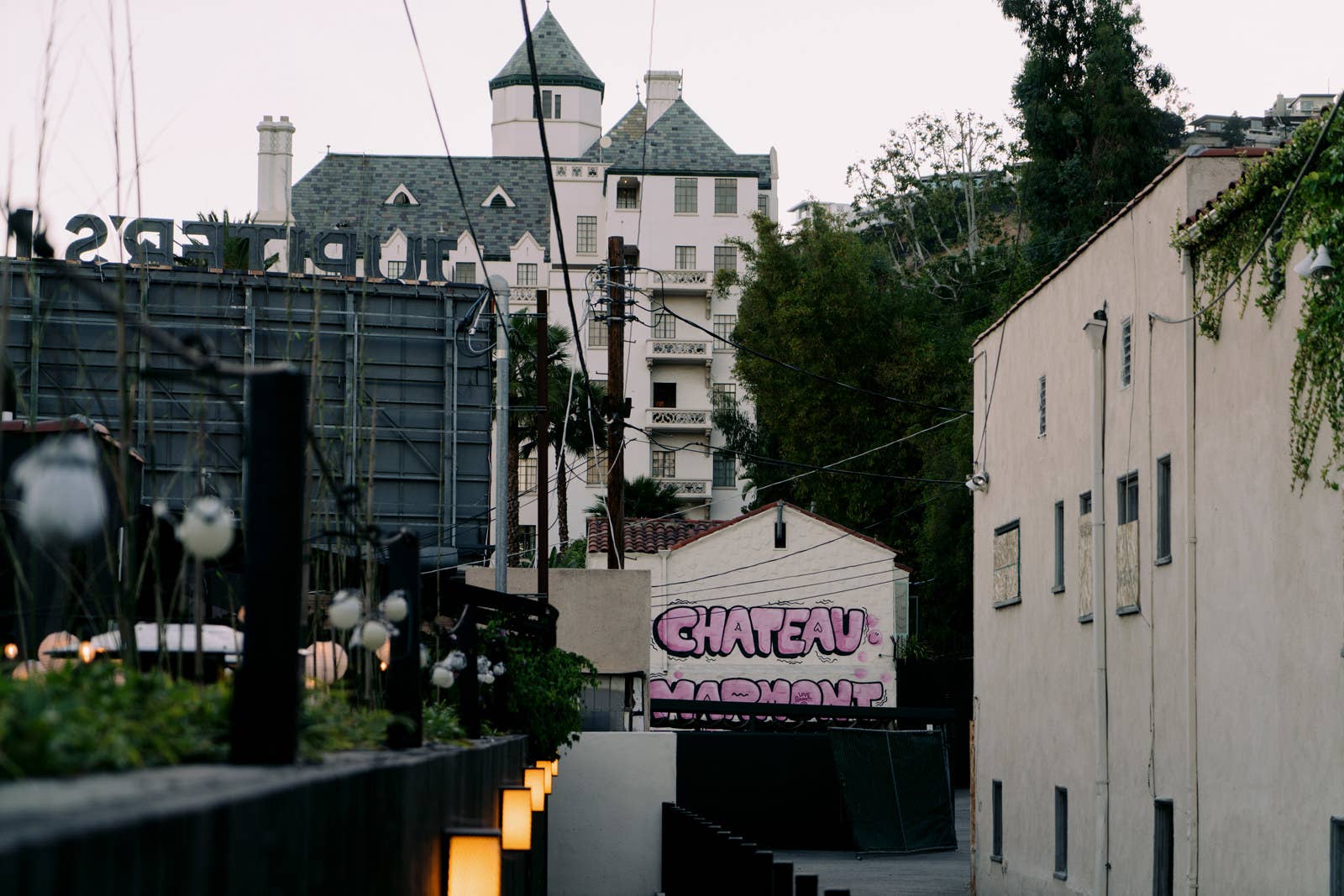
Nolwen Cifuentes for BuzzFeed News
The rear area of the Chateau Marmont in Los Angeles.
Banks was one of the hundreds of employees whom the Chateau Marmont fired in March last year as hotels’ occupancy rates plummeted. Kurt Petersen, copresident of Unite Here Local 11, a labor union that represents hospitality workers in Southern California, said the Chateau neither offered its employees severance nor extended their health benefits beyond a few weeks.
In the months after Banks was laid off, Los Angeles slowly but surely grew into a COVID hot spot. Some of the city’s highest case rates were recorded in neighborhoods where residents are more likely to live in cramped spaces and hold low-paying “essential” jobs with little to no workplace protections.
Meanwhile, as thousands of essential workers got sick and those in hospitality were forced to choose between unemployment and risking their health, the lifestyles of the rich and fabulous sauntered on. Despite stay-at-home orders and a statewide mask mandate, celebrities and influencers threw ragers, brazenly flouted safety guidelines, and challenged public criticism by lamenting, as Kris Jenner did, that “all we can do is live our lives the best way we know how.” California lawmakers, including Gov. Gavin Newsom, attended birthday dinners and traveled with lobbyists to Hawaii, disregarding the very restrictions they had ordered.
As Banks watched politicians and celebrities gallivant around town, it struck her that the only people who were out were the ones who could afford to get sick. “They can’t possibly put themselves into the shoes of other people,” Banks said.
Banks took safety precautions as seriously as she could, limiting trips to the grocery store, passing up invites to socialize, and staying home. She was furloughed twice from her second job as a recruiter and then laid off in July. She waited for cases to go down and for her job at the Chateau to materialize again, all while watching the rich and powerful in her city, her state, and her country behave as if COVID-19 weren’t killing 4,000 people in the US a day at its peak.
“They can’t possibly put themselves into the shoes of other people.”
But the longer she waited, the worse it got. Restaurants were closing, many unlikely to return. Hotels were not operating at full capacity. No one was hiring. Her credit card debt piled up.
“You're just kind of waiting around for nothing,” she said. “I was sinking money into rent. At some point, I thought, If I don't make a decision now, then I'll have no money to live off of.”
Banks stayed in LA for a few more months until she could no longer justify pouring what little savings she had into rent and bills. In December, she moved back into her parents’ home in Stafford, Virginia, with $2,500 to her name. By the end of that month, after being served with a lawsuit from Wells Fargo for falling behind on her payments, she filed for bankruptcy.
Banks, who lived paycheck to paycheck before the pandemic, has not worked since August. After moving back in with her parents, she decided it was not worth contracting the virus and potentially exposing them for a job that paid $10 an hour. Even though she will be fully inoculated against COVID-19 by mid-June, she isn’t eager to jump back into the workforce.
“It hasn't even been a full year that I've taken off work, but I personally feel like a failure, I guess,” Banks said. “Society makes you feel like you have to be working all the time, you have to be producing all the time, you have to be doing all these things. But in my mind, I'm thinking, Well, this is my year off to relax. Then for the rest of my life, I'm going to be working.”
Posted on May 28, 2021,

Ting Shen for BuzzFeed News
Keisha Banks
For two decades, Keisha Banks had worked on and off in the hospitality industry — until last year, when she was unceremoniously let go from her job as an event server at the Chateau Marmont via a mass email sent in March 2020 to employees of the iconic Hollywood hotel.
Banks, 41, had an inkling that things were going downhill in the industry as soon as hotel guests started “dropping off like flies” in early March, canceling their reservations for events and rooms. She told BuzzFeed News she was taken aback because the notice was “vague and impersonal.”
“When you work at Chateau, one of the things they say is, ‘We're all like family here,’” Banks said. “And then to get this really blunt, ‘You’re cut off’ email was bad.”
It was the first in a streak of unfortunate events that has upended her life and the lives of many others like her.
As tourism collapsed and businesses closed down in the early weeks of the pandemic, millions of people became unemployed, facing down a world of uncertainty. No industry dodged the effects of the pandemic, but almost none was clobbered as hard as leisure and hospitality, which saw its unemployment rate peak in April 2020 at a staggering 39%.
Now, as the US emerges from the pandemic, with 50% of adults fully vaccinated as of the end of May, workers are returning to industries decimated by COVID-19. Many businesses are reopening and travel numbers are rebounding, and there were notable hospitality job gains in April 2021, according to the Bureau of Labor Statistics. But employment in the industry is still down by 2.8 million, or 16.8%, since February last year. Some businesses, especially those in hospitality, have reportedly struggled to find workers as they reopen. As a result, some business owners have concluded that unemployment benefits are too robust, rather than that their businesses are not paying people enough. In recent weeks, some two dozen Republican governors have ended the extra $300 per week in federal unemployment benefits in their states so as to force people back to work.
But for many workers, the pandemic has exposed fundamental flaws with how the hospitality industry operates. In many cases, they are being asked to go back to jobs with weak employment and safety protections, and for pay that still does not reflect the value of their work or the economic destruction that the pandemic wrought on their lives. After 15 months of tumult, not everyone is ready or willing to return to a job that underpays, offers no paid sick leave, and treats them as expendable.
For Banks, who has long looked to hospitality work to bolster her income, she’s hesitant to return to an industry that has not done right by her. And she no longer feels like she can rely on this line of work the way she used to.
“It would mean going back to a broken system,” she said. “Why should rich people get to choose their careers and the rest of us be forced to get just the less fulfilling jobs that are left over?”

Nolwen Cifuentes for BuzzFeed News
The rear area of the Chateau Marmont in Los Angeles.
Banks was one of the hundreds of employees whom the Chateau Marmont fired in March last year as hotels’ occupancy rates plummeted. Kurt Petersen, copresident of Unite Here Local 11, a labor union that represents hospitality workers in Southern California, said the Chateau neither offered its employees severance nor extended their health benefits beyond a few weeks.
In the months after Banks was laid off, Los Angeles slowly but surely grew into a COVID hot spot. Some of the city’s highest case rates were recorded in neighborhoods where residents are more likely to live in cramped spaces and hold low-paying “essential” jobs with little to no workplace protections.
Meanwhile, as thousands of essential workers got sick and those in hospitality were forced to choose between unemployment and risking their health, the lifestyles of the rich and fabulous sauntered on. Despite stay-at-home orders and a statewide mask mandate, celebrities and influencers threw ragers, brazenly flouted safety guidelines, and challenged public criticism by lamenting, as Kris Jenner did, that “all we can do is live our lives the best way we know how.” California lawmakers, including Gov. Gavin Newsom, attended birthday dinners and traveled with lobbyists to Hawaii, disregarding the very restrictions they had ordered.
As Banks watched politicians and celebrities gallivant around town, it struck her that the only people who were out were the ones who could afford to get sick. “They can’t possibly put themselves into the shoes of other people,” Banks said.
Banks took safety precautions as seriously as she could, limiting trips to the grocery store, passing up invites to socialize, and staying home. She was furloughed twice from her second job as a recruiter and then laid off in July. She waited for cases to go down and for her job at the Chateau to materialize again, all while watching the rich and powerful in her city, her state, and her country behave as if COVID-19 weren’t killing 4,000 people in the US a day at its peak.
“They can’t possibly put themselves into the shoes of other people.”
But the longer she waited, the worse it got. Restaurants were closing, many unlikely to return. Hotels were not operating at full capacity. No one was hiring. Her credit card debt piled up.
“You're just kind of waiting around for nothing,” she said. “I was sinking money into rent. At some point, I thought, If I don't make a decision now, then I'll have no money to live off of.”
Banks stayed in LA for a few more months until she could no longer justify pouring what little savings she had into rent and bills. In December, she moved back into her parents’ home in Stafford, Virginia, with $2,500 to her name. By the end of that month, after being served with a lawsuit from Wells Fargo for falling behind on her payments, she filed for bankruptcy.
Banks, who lived paycheck to paycheck before the pandemic, has not worked since August. After moving back in with her parents, she decided it was not worth contracting the virus and potentially exposing them for a job that paid $10 an hour. Even though she will be fully inoculated against COVID-19 by mid-June, she isn’t eager to jump back into the workforce.
“It hasn't even been a full year that I've taken off work, but I personally feel like a failure, I guess,” Banks said. “Society makes you feel like you have to be working all the time, you have to be producing all the time, you have to be doing all these things. But in my mind, I'm thinking, Well, this is my year off to relax. Then for the rest of my life, I'm going to be working.”
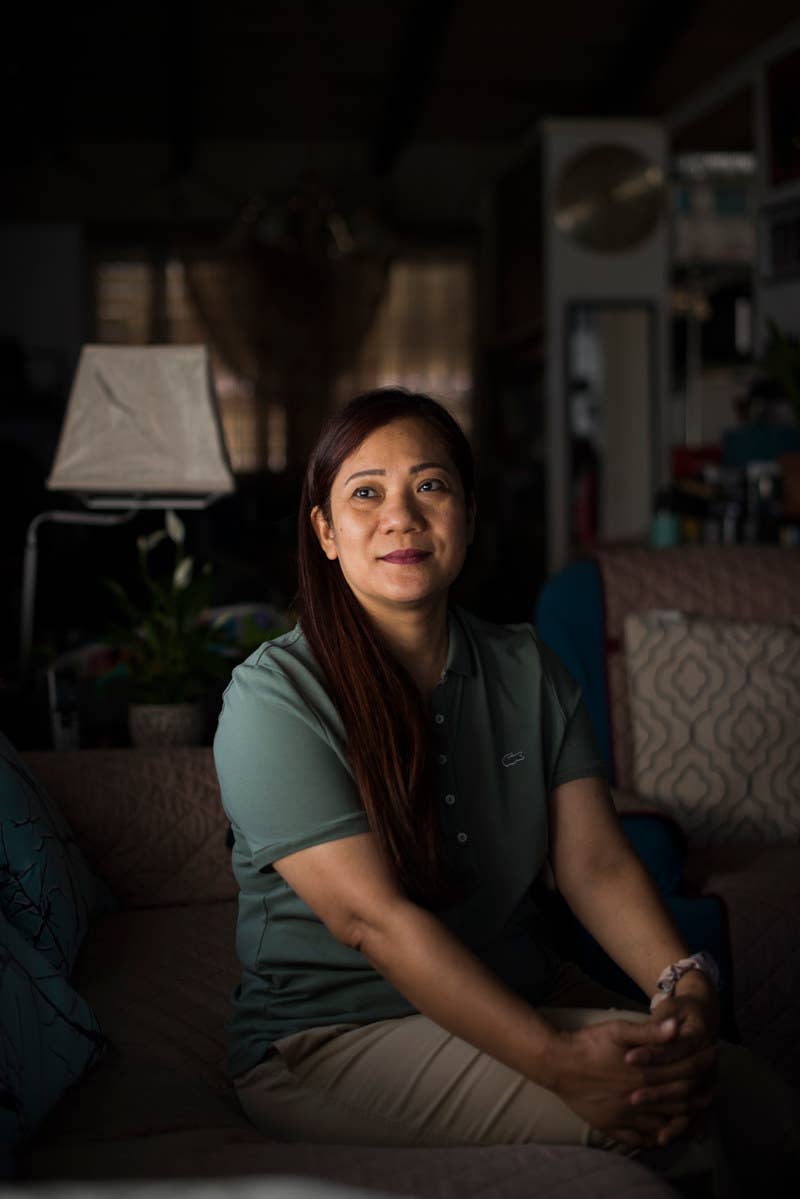
Elyse Butler for BuzzFeed News
May Chang
The pandemic placed hospitality workers in a losing position. Those who were able to keep working were forced into a situation that endangered their health and safety, or that of their family.
May Chang, 52, had to weigh this risk last summer, when her former employer, Ala Moana Hotel in Honolulu, asked if she would be ready to go back to work soon. It was six months after she was laid off from her job as a housekeeper at the luxury resort. Although she desperately needed work, Chang, who lived with her husband, two daughters, and a baby grandson, had to consider her family’s safety.
She and her husband sat down and discussed if they could afford to scrape by for a few more months without her income. There were bills to pay. Her brother in the Philippines relied on money she sent to get medical treatment for his epilepsy. Chang’s unemployment claims had not yet been approved. Her husband, a bank teller, was still going to work, but with reduced hours and pay. At 65, he had planned to retire soon but instead clung to his job because both he and Chang needed health insurance.
Her unemployment benefits finally started coming in after months of delay, but it was far less than what she had earned from her job. Going back to work would alleviate some of the pressure, but COVID cases were hitting record highs in Oahu that month when her employer contacted her. Chang was also anxious about protecting her husband, whose health issues would put him at a higher risk if he contracted the virus, and her grandson, who was only a few months old.
“I was so afraid to expose myself out there, especially [in a] hotel, you have all kinds of people there from other countries,” she said. So she told her employer that she wanted to go back to work and hoped that they would keep her in mind, but was not yet comfortable doing so.
The tourism industry represents nearly a quarter of Hawaii’s economy, researcher and economics professor Sumner LaCroix told Hawaii Public Radio; data from the Bureau of Labor Statistics show that more than 50% of the state’s hospitality workforce was cut in the early months of the pandemic.
The state has inched toward reopening since the vaccines arrived. State travel data show that Hawaii saw nearly twice the number of visitors in each of the last three months than it did in January or February. The state initially mandated that all visitors during the pandemic commit to a self-quarantine period. In mid-October last year, however, travelers could forgo the quarantine period if they could prove they tested negative for COVID prior to boarding. Though the pretravel testing program was touted as a step toward reopening tourism in the state, the policy received pushback from locals who were angered by tourists flouting COVID guidelines. In May, Hawaii rolled out a vaccination passport program, which allowed residents to travel freely within the state without testing or quarantining, but it doesn’t apply to out-of-state travelers yet.
Chang had been hoping for months that hotels’ occupancy rates would increase so she could go back to work. She and her coworkers were in discussions with hotel management and their local union on how to prioritize their safety when they return. After being fully vaccinated in April, Chang waited daily for Ala Moana to ask her to return to work; every morning, she got ready and prepared her uniform, just in case.
On May 25, she finally got the call and went back to work for the first time in more than a year. “I've been waiting for so long,” she said. “I'm so excited.”
The pandemic placed hospitality workers in a losing position. Those who were able to keep working were forced into a situation that endangered their health and safety, or that of their family.
May Chang, 52, had to weigh this risk last summer, when her former employer, Ala Moana Hotel in Honolulu, asked if she would be ready to go back to work soon. It was six months after she was laid off from her job as a housekeeper at the luxury resort. Although she desperately needed work, Chang, who lived with her husband, two daughters, and a baby grandson, had to consider her family’s safety.
She and her husband sat down and discussed if they could afford to scrape by for a few more months without her income. There were bills to pay. Her brother in the Philippines relied on money she sent to get medical treatment for his epilepsy. Chang’s unemployment claims had not yet been approved. Her husband, a bank teller, was still going to work, but with reduced hours and pay. At 65, he had planned to retire soon but instead clung to his job because both he and Chang needed health insurance.
Her unemployment benefits finally started coming in after months of delay, but it was far less than what she had earned from her job. Going back to work would alleviate some of the pressure, but COVID cases were hitting record highs in Oahu that month when her employer contacted her. Chang was also anxious about protecting her husband, whose health issues would put him at a higher risk if he contracted the virus, and her grandson, who was only a few months old.
“I was so afraid to expose myself out there, especially [in a] hotel, you have all kinds of people there from other countries,” she said. So she told her employer that she wanted to go back to work and hoped that they would keep her in mind, but was not yet comfortable doing so.
The tourism industry represents nearly a quarter of Hawaii’s economy, researcher and economics professor Sumner LaCroix told Hawaii Public Radio; data from the Bureau of Labor Statistics show that more than 50% of the state’s hospitality workforce was cut in the early months of the pandemic.
The state has inched toward reopening since the vaccines arrived. State travel data show that Hawaii saw nearly twice the number of visitors in each of the last three months than it did in January or February. The state initially mandated that all visitors during the pandemic commit to a self-quarantine period. In mid-October last year, however, travelers could forgo the quarantine period if they could prove they tested negative for COVID prior to boarding. Though the pretravel testing program was touted as a step toward reopening tourism in the state, the policy received pushback from locals who were angered by tourists flouting COVID guidelines. In May, Hawaii rolled out a vaccination passport program, which allowed residents to travel freely within the state without testing or quarantining, but it doesn’t apply to out-of-state travelers yet.
Chang had been hoping for months that hotels’ occupancy rates would increase so she could go back to work. She and her coworkers were in discussions with hotel management and their local union on how to prioritize their safety when they return. After being fully vaccinated in April, Chang waited daily for Ala Moana to ask her to return to work; every morning, she got ready and prepared her uniform, just in case.
On May 25, she finally got the call and went back to work for the first time in more than a year. “I've been waiting for so long,” she said. “I'm so excited.”
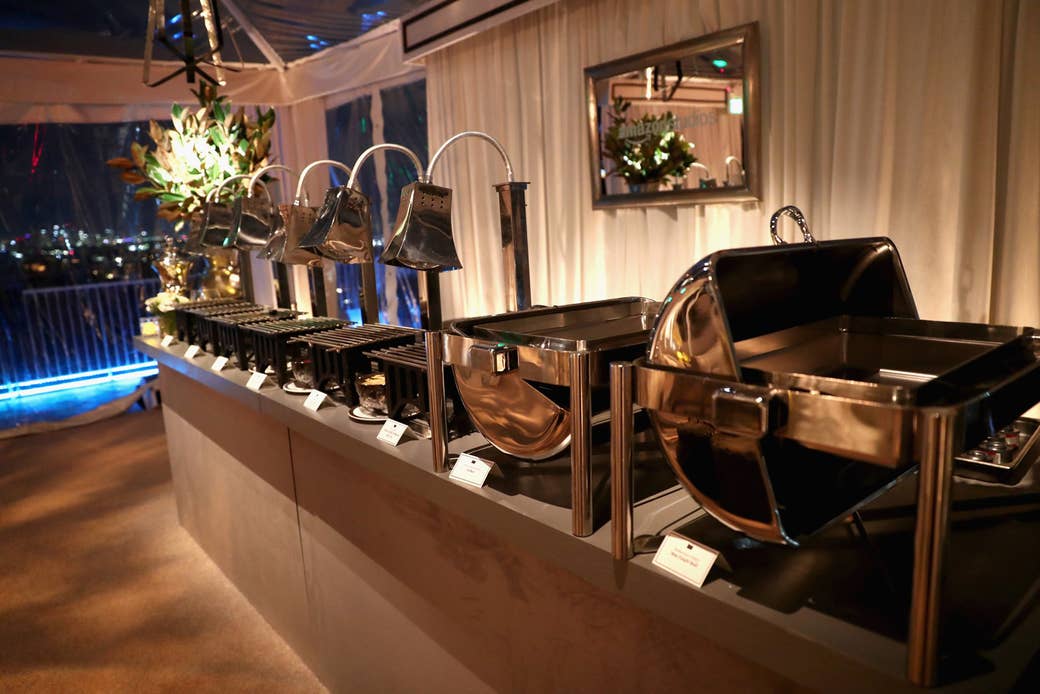
Todd Williamson / Getty Images for Amazon
Like Chang, Ana Cortez sent money to El Salvador to help her 87-year-old mom get by. But it became even harder to do so after Cortez lost her job in April 2020 as a housekeeper at the Beverly Hilton, a luxury hotel in Beverly Hills known for hosting the Golden Globe Awards and other star-studded events.
After losing her job, Cortez, 63, got by on unemployment benefits; it was the first time in her four decades in the US that she had to apply for unemployment, she said. She has scrimped and saved where she could and relied on food banks for sustenance so that she had money for her mom, who has epilepsy.
“I'm going to do whatever I need to help take care of my mom,” Cortez told BuzzFeed News in Spanish.
When the Beverly Hilton called her back for a six-day stretch of employment in October, she went into work under a cloud of grief. Her brother, who went back to El Salvador to care for their mom, had contracted COVID and died. He was one of four of Cortez’s family members who had died of COVID following the deaths of her grandmother and two uncles in El Salvador.
In Los Angeles County, COVID-19 has disproportionately impacted the Latino population. The virus has killed Latino residents at three times the rate of white residents, according to county data, and a recent University of Southern California study found that Latino immigrants between the ages of 20 and 54 are more than 11 times more likely to die from COVID-19 than non-Hispanic US-born residents.
Amid one of the worst outbreaks of the pandemic, LA County saw a 1,000% increase in the COVID death rate among Latinos from November 2020 to February 2021.
For all the financial difficulties and the personal grief of this past year, Cortez, who is currently back in El Salvador, said she’s thankful that she and her children, whom she lives with, did not contract COVID.
“Thank god, no,” she said. “Me and my sons”
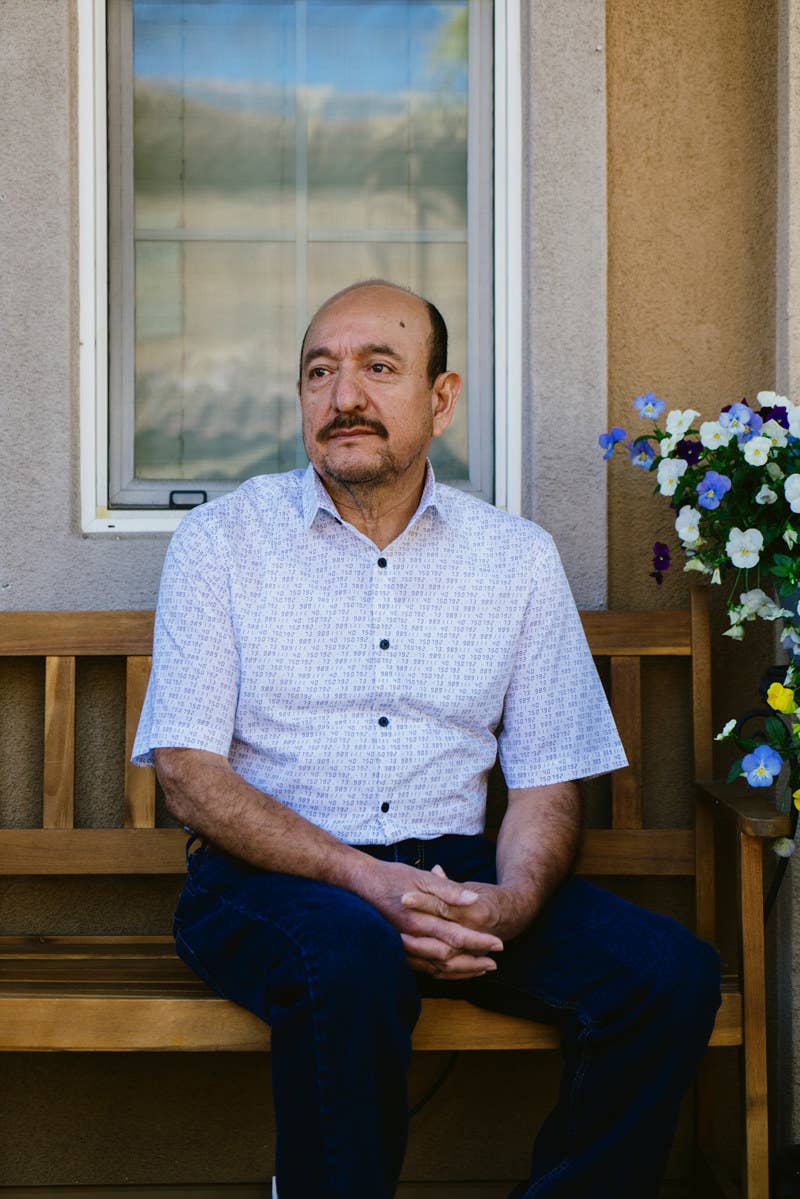
Nolwen Cifuentes for BuzzFeed News
Carlos BarreraCarlos Barrera didn’t have much of a retirement plan beyond working until 70 and returning to Guatemala, his home country. He had been focused on paying bills and the rent, and making sure his and his wife’s medical needs were covered. Saving for retirement had to come after everything else.
Barrera, 62, also worked at the Chateau Marmont as a parking valet. He enjoyed the job, greeting guests, making small talk, and parking their extravagant luxury cars. He intended to do it the rest of his working life. But in March 2020, Barrera received a text message from his manager informing him that he was being laid off from the Chateau because of the pandemic.
He was stunned. After 40 years of being a reliable employee, he could not believe the hotel would treat him with such disrespect.
“I felt very bad,” Barrera said in Spanish. “I felt disappointed, sad that they never valued me there.”
Even with his job at the Chateau Marmont, Barrera was priced out of Los Angeles seven years ago. He and his wife had moved to Santa Clarita to live with their adult sons. He lived day to day, he said, and tried his best to provide for his family. Although his employer offered a 401(k) plan, Barrera never contributed to it; he was already struggling to get by on his weekly income.
When the hotel fired him, Barrera had little time to process what had happened before panic set in. March 30, 2020, was the last day that he had employer-provided healthcare; though he had applied for Medi-Cal, it would not kick in for months. He and his wife, who has diabetes, needed medication for their health issues.
Barrera was in a state of constant anxiety during that time, terrified of contracting COVID and passing it to his family. He was stressed about the cost of clinic appointments, medications, bills, car payments, and his share of rent.
Before the pandemic, Barrera said he had about $6,000 in savings, part of which he had hoped would go toward retirement. But his savings have been completely depleted in the past year, he said.
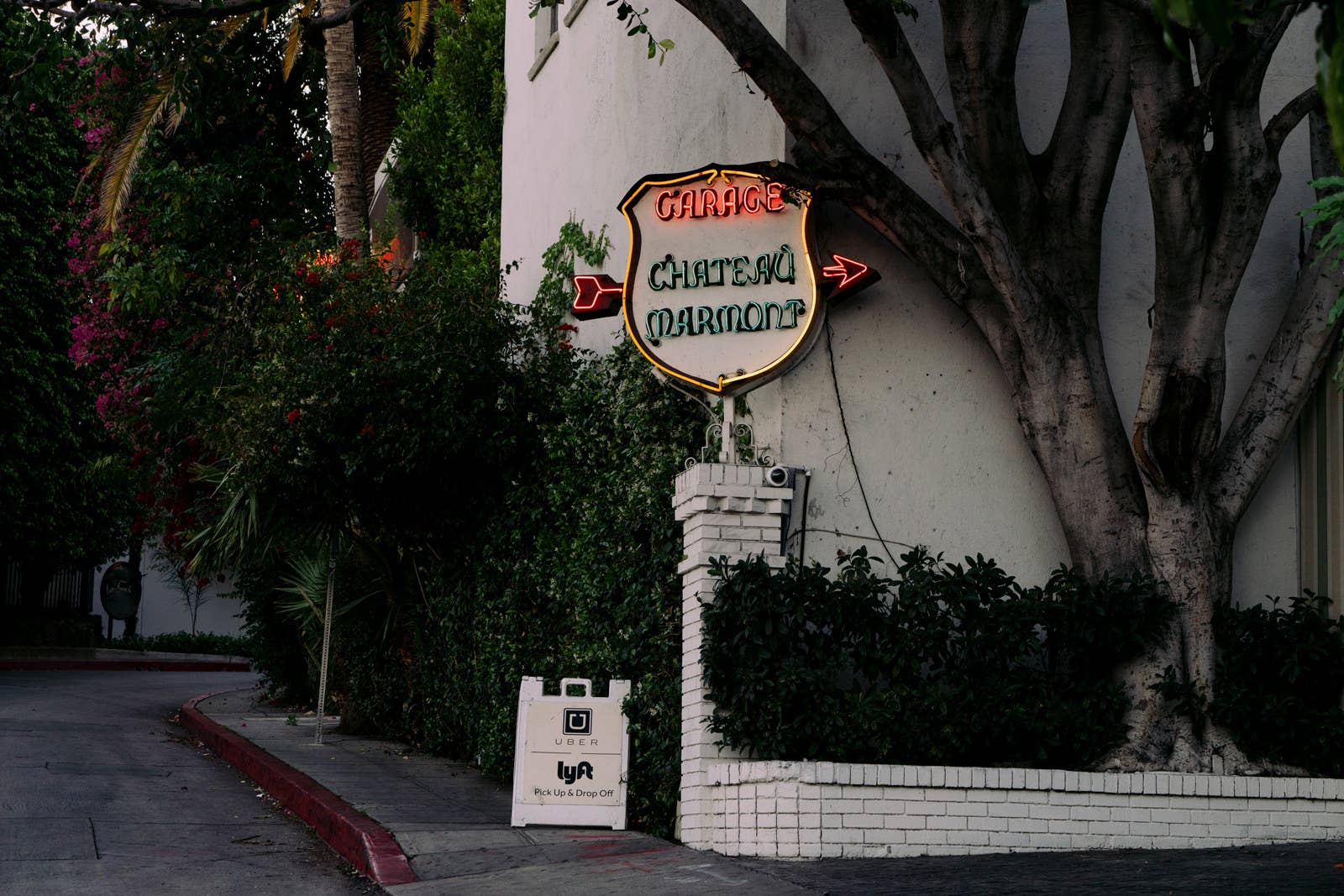
Nolwen Cifuentes for BuzzFeed News
The valet zone at Chateau Marmont in Los Angeles where Barrera worked as a parking valet. Barrera was fired by the hotel in March last year as a response to dropping hotel occupancy rates.
In December, after months of searching for work, Barrera landed a job as a pizza delivery driver, working 25 hours a week. He said his financial situation has remained “terrible.” His last paycheck, after taxes, netted him $500 for two weeks of work. Every dollar he earns goes toward his portion of the rent, which costs him $1,000 a month.
The last time Barrera checked in with a manager at the Chateau Marmont in May, he was told no positions were available. He hopes every day that the hotel will hire him again, especially once California reopens on June 15. He and his former coworkers have been publicly fighting to return to work under safe and dignified conditions.
Barrera was in a state of constant anxiety during that time, terrified of contracting COVID and passing it to his family. He was stressed about the cost of clinic appointments, medications, bills, car payments, and his share of rent.
Before the pandemic, Barrera said he had about $6,000 in savings, part of which he had hoped would go toward retirement. But his savings have been completely depleted in the past year, he said.
In December, after months of searching for work, Barrera landed a job as a pizza delivery driver, working 25 hours a week. He said his financial situation has remained “terrible.” His last paycheck, after taxes, netted him $500 for two weeks of work. Every dollar he earns goes toward his portion of the rent, which costs him $1,000 a month.
The last time Barrera checked in with a manager at the Chateau Marmont in May, he was told no positions were available. He hopes every day that the hotel will hire him again, especially once California reopens on June 15. He and his former coworkers have been publicly fighting to return to work under safe and dignified conditions.
Since the mass layoffs in March 2020, former Chateau workers have filed lawsuits alleging employment and racial discrimination, as well as sexual harassment. Banks, the event server, told BuzzFeed News that the work culture at the Chateau “favors white men specifically” and that men were more likely than women to be asked to do specific work that enabled them to earn overtime pay.
With help from Local 11, former workers including Barrera have asked the hotel’s clientele to avoid staying at the Chateau until it has “demonstrated a commitment to respecting its workers’ years of service by rehiring them in accordance with their legal rights and to ensuring that all workers — regardless of their race, sex, or background — feel treated with dignity and respect.” A number of high-profile Hollywood figures have supported the boycott, according to the union, including Jane Fonda and Alfonso Cuarón.
“They couldn’t see fit to pay the people that are feeding them a decent wage.”
The Chateau Marmont did not respond to multiple requests for comment regarding the accusations in the lawsuit, Banks’s allegations about its work culture, and the campaign organized by former employees.
Banks has wondered if she would take another hospitality job when she returns to Los Angeles, and what she would do if the Chateau offered her her job back. She has worked in hospitality since she was 18, either in between other jobs or for extra money when a salaried position didn’t pay enough.
But Banks has had a front-row seat to the ever-widening chasm between the wealthy and the low-income residents over the past year. She has seen rich people vacation, buy houses, and behave badly — often at the expense of service employees — while workers like her have lost everything. She recalled the sounds of people socializing in their multimillion-dollar mansions in the Hollywood Hills last year in the middle of the pandemic.
“We would go out for a walk at night sometimes and hear the clanking of dishes and people talking,” she said, “and you're like, Are they having a dinner party at their house?”
Most of the people who spoke with BuzzFeed News said they hoped that the hospitality industry will bounce back soon and that they will have their jobs again. But Banks said that after seeing how people have behaved over the past year, she’s not optimistic. Just because the country is headed out of the pandemic and into a new normal doesn’t mean Banks or the millions of others like her will be able to find a job that pays a living wage again — or any job at all.
Banks watched with disgust in February as Congress shot down a $15 federal minimum wage, calling it “super discouraging.”
“If after all of this ... they couldn't see fit to pay the people that are feeding them a decent wage,” Banks said. “They're just trying to make people desperate and force them back into work.” ●
No comments:
Post a Comment